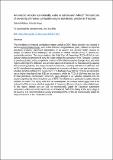Are electric vehicles economically viable in sub-Saharan Africa? The total cost of ownership of internal combustion engine and electric vehicles in Tanzania
Abstract
The prevalence of internal combustion engine vehicle (ICEV) fleets globally has resulted in various environmental issues, such as the emissions of greenhouse gases, reliance on imported petroleum products, significant degradation of air quality, and adverse health impacts on people. To address these challenges, the adoption of electric vehicles (EVs) is viewed as a sustainable solution. This study analyzed the Total Cost of Ownership (TCO) of EVs in sub-Saharan Africa to determine if they are viable options for consumers from Tanzania. Contrary to previous studies on the competitive position of EVs that focused on Europe, Asia, and other regions with high EV diffusion, and are more advanced in terms of EV manufacturing capacity and promoting policies, this study focused on Tanzania, a country with low EV diffusion and no EV manufacturing capacity. We compared the economics of electric cars and electric two-wheelers (e2Ws) and their ICE counterparts. The findings show that the TCO per km of electric cars is higher than that of their ICE car counterparts, while the TCO of e2W was less than that of their petroleum counterparts. Importing taxes charged to all vehicles imported into the country significantly hike the upfront cost of EVs. For electric cars, particularly battery electric vehicles, to reach TCO parity with ICE car counterparts, the current import taxes have to be reduced by 40% or more, which is equivalent to removing all import duty or value-added taxes. In this regard, electric cars are still not economically viable for Tanzanian automotive consumers, unless economic incentives are introduced. With EVs being in the early stage in the country, it is recommended to start by promoting e2Ws, which are economically viable for many consumers in the Tanzanian context.
URI
https://doi.org/10.1016/j.tranpol.2023.07.014https://dspace.nm-aist.ac.tz/handle/20.500.12479/2242

